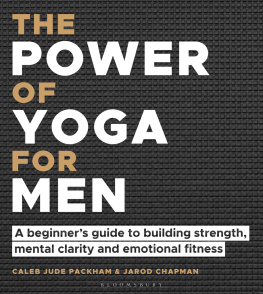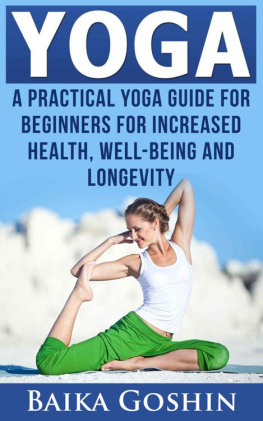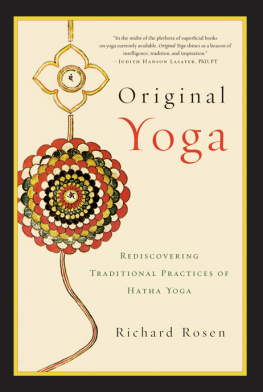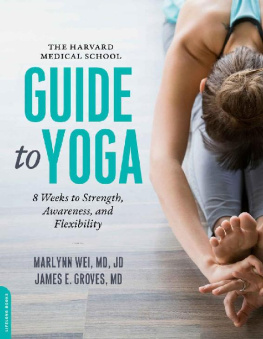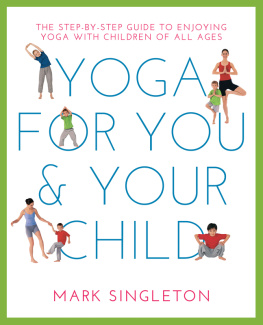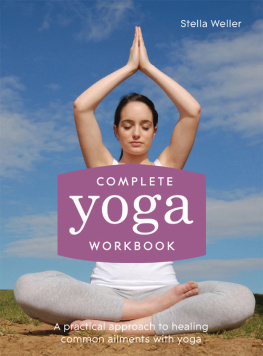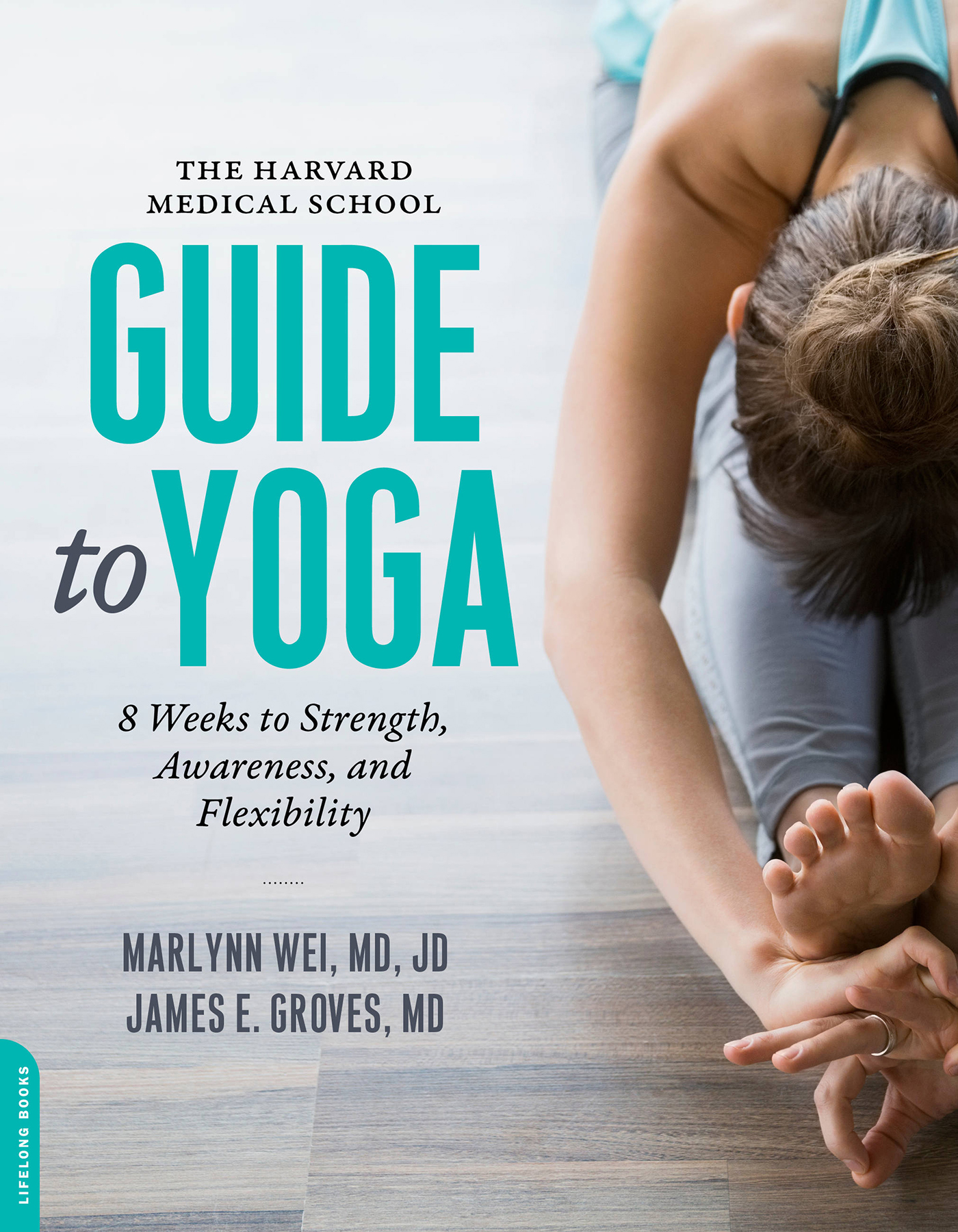Many of the designations used by manufacturers and sellers to distinguish their products are claimed as trademarks. Where those designations appear in this book and Da Capo Press was aware of a trademark claim, the designations have been printed in initial capital letters.
Copyright 2017 by Harvard University
Illustrations, Figures, and Tables: Marlynn Wei, MD, JD
All rights reserved. No part of this publication may be reproduced, stored in a retrieval system, or transmitted, in any form or by any means, electronic, mechanical, photocopying, recording, or otherwise, without the prior written permission of the publisher. For information, address Da Capo Press, 53 State Street, 9th floor, Boston, MA 02109.
Designed by Jeff Williams
Set in 11.25 point Fairfield by the Perseus Books Group
Library of Congress Cataloging-in-Publication Data
Names: Groves, James E., author. | Wei, Marlynn, author.
Title: The Harvard Medical School guide to yoga : eight weeks to strength, awareness, and flexibility / by Marlynn Wei, MD, JD and James Groves MD.
Description: First Da Capo Press edition. | Boston, MA : Da Capo Lifelong Books, a member of the Perseus Books Group, 2017.
Identifiers: LCCN 2016057402 | ISBN 9780738219363 (paperback) | ISBN 9780738219370 (ebook)
Subjects: LCSH: Hatha yogaPopular works. | Self-care, HealthPopular works. | BISAC: HEALTH & FITNESS / Yoga. | BODY, MIND & SPIRIT / Meditation.
Classification: LCC RA781.7 .G77 2017 | DDC 613.7/046dc23 LC record available at https://lccn.loc.gov/2016057402
Published by Da Capo Press, an imprint of Perseus Books, LLC, a subsidiary of Hachette Book Group, Inc.
www.dacapopress.com
Note: The information in this book is true and complete to the best of our knowledge. This book is intended only as an informative guide for those wishing to know more about health issues. In no way is this book intended to replace, countermand, or conflict with the advice given to you by your own physician. The ultimate decision concerning care should be made between you and your doctor. We strongly recommend you follow his or her advice. Information in this book is general and is offered with no guarantees on the part of the authors or Da Capo Press. The authors and publisher disclaim all liability in connection with the use of this book.
Da Capo Press books are available at special discounts for bulk purchases in the U.S. by corporations, institutions, and other organizations. For more information, please contact the Special Markets Department at the Perseus Books Group, 2300 Chestnut Street, Suite 200, Philadelphia, PA, 19103, or call (800) 810-4145, ext. 5000, or e-mail special.markets@perseusbooks.com.
E3-20170602-JV-PC
The Harvard Medical School Guide to Yoga is a wonderful addition to the yoga library that helps bridge the gap between East and West. The yoga world has to clean up its act in order to find its deserved place in the world of medicine, and this manual is a necessary step. The practices and research are sound.
RODNEY YEE, internationally renowned yoga instructor
Every so often a manual emerges from the sea of how-to yoga books and startles by virtue of its eminent accessibility, its breathtaking comprehensiveness, its scientific underpinnings, its remarkable clarity, and its immediate applicability. Dr. Marlynn Wei and Dr. James Grovess The Harvard Medical School Guide to Yoga is just such a manual. Inspired and inspirational, this book includes a treasure trove of easy-to-follow illustrations of numerous yoga poses; it will be an invaluable resource for all students of yoga interested not only in toning their body and reducing their stress but also, more generally, in evolving their health to ever-higher levels of mental, physical, and spiritual well-being.
MARTHA STARK, MD, author of Relentless Hope: Refusal to Grieve and six other award-winning integrative psychiatry books
Wei and Groves are reaching out to you, inspiring, coaxing, and above all informing about the path you can take for health and wellness of your inseparable body, mind, and soul. The lessons contained herein are encyclopedic in scope, but the message is of a journey that lies ahead for you, within you, accessible and transformative. Whether needed to enhance well-being and facilitate recovery for those who suffer or are ill or to just make this one life at once more peaceful, reflective, calm, and energetic, TheHarvard Medical School Guide to Yoga can be your itinerary.
JERROLD F. ROSENBAUM, MD, chief of psychiatry, Massachusetts General Hospital; Stanley Cobb Professor of Psychiatry, Harvard Medical School
Marlynn Wei and James Groves have done the public a great service. They are physicians whove learned by acquaintance how yoga can be a powerful aid to health. Consequently they have produced a thorough and very accessible guide replete with tables and summaries and simple drawings, which leaves the reader with an excellent grasp of this particular pathway to wellness.
GREGORY L. FRICCHIONE, MD, director, Benson Henry Institute for Mind Body Medicine at Harvard Medical School
It is amazing to me that yoga has become popular enough that professors at Harvard Medical School would publish a book on the subject. Giving people more information and helping them find their way is what I see as being the great purpose of a book on the subject of yoga. Blessings to Marlynn Wei and James E. Groves for helping make this Divine Knowledge available to you, and may all achieve success in yoga.
SRI DHARMA MITTRA, creator of the Master Yoga Chart of 908 Postures
To the teacher who lives within each of us.
While the authors of this book have taken great care in presenting the material you will find in this book, the book is not intended as a substitute for professional medical advice. The medical information is provided as an information resource only and is not to be used or relied on for any diagnostic or treatment purposes. This information is not intended to be patient education, does not create any patient-physician relationship, and should not be used as a substitute for professional diagnosis and treatment. If you have any health concerns or conditions that warrant special attention, please seek the advice of a health professional before beginning a yoga practice or attempting any of the practices or poses described in this book. If you experience pain or other side effects when trying the poses presented here, please seek appropriate medical attention.
For beginners, rapid and forceful breathing exercises, such as the Breath of Fire (see ), should be done only with the guidance and supervision of a certified yoga teacher. Rigorous, forceful breathing should also be avoided during pregnancy. People with medical conditions, such as high blood pressure, such respiratory issues as asthma, seizure disorders, panic or anxiety disorders, or bipolar disorder should check with their doctor first before doing such yoga breathing because it can lead to high blood pressure and hyperventilation, which can then trigger such medical issues as seizures, panic attacks, or asthma episodes.
Its important to remember that yoga breathing exercises should never be painful. If you experience sudden pain or difficulty breathing during or after intense yoga breathing, you should stop immediately and seek medical attention. The risk of yoga breathing is unclear since it is not yet studied on a large scale, so its important to discuss it with your own doctor before trying these techniques.


